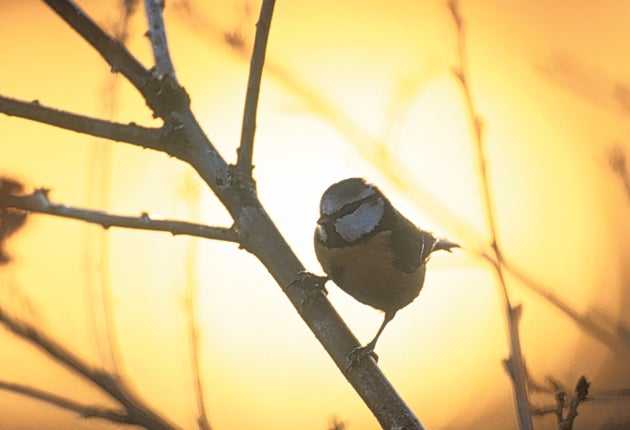Light pollution is taking its toll on mating rituals of songbirds

The night-time glow from cities is affecting the birds of the forest. Light pollution from streetlamps and house lights that can reduce darkness over huge areas is having a real impact on the mating life of songbirds, new research has shown.
German ornithologists have found that male birds, which normally join the dawn chorus to attract mates or proclaim their territories, start singing earlier in the morning if they are near streetlights.
They are also more successful in attracting "extra-pair" mates – females other than their primary social partners – while females with territories near streetlights lay their eggs earlier.
The research, showing the disturbance to natural behaviour patterns, comes from the Max Planck Institute for Ornithology, and adds to a growing realisation that light pollution is a problem in today's increasingly urbanised world. Until now, the issue has been highlighted by astronomers who find it more and more difficult to see the stars from where they live.
But it is on the natural world that light pollution has the most serious affect. "In comparison to chemical and noise pollution, light pollution is more subtle, and its effects have perhaps not received the attention they deserve," said Bart Kempenaers, the leader of the research team at the Max Planck Institute.
Artificial light at night may affect mammals, insects and even trees, but birds seem to be the worst affected. Light pollution may be contributing to the decline in owl numbers as light reduces the area of suitable hunting habitat, and research has shown that it also gives a major advantage to birds of prey such as the peregrine, which increasingly hunts in cities.
Most of all, light pollution affects the timing of the dawn chorus, the burst of birdsong which occurs at the start of a new day, and the Max Planck study is the first investigate and document changes in breeding behaviour associated with it. "Our findings show clearly that light pollution influences the timing of breeding behaviour, with unknown consequences for bird populations," Dr Kempenaers said.
Looking at the effects of artificial lighting on dawn song in five common forest-breeding songbirds, it was found that in four of those five species, males near streetlights started singing significantly earlier in the morning than did males in other parts of the forest.
Further study of the effects of that behavioural shift on blue tits showed real consequences. Females near streetlights laid their eggs on average a day and half earlier, and males near lights at the forest's edges were more successful in attracting extra-pair mates, meaning that they more often sired offspring with females which were not their normal partners.
While that might sound like a bonus for those males, Dr Kempenaers said it was not necessarily good for the species, or even for the males in question. "Earlier singing during the morning may come at a cost to males," he said, noting that they may get less sleep and be at higher risk of predation. "Secondly, females are thought to engage in extra-pair copulations with high-quality sires to increase the quality of their offspring.
"These females may use early singing as a cue reflecting male quality. But light pollution may disrupt the link between the cue – early singing – and male quality, so that females would end up having their offspring sired by lower-quality males."
Join our commenting forum
Join thought-provoking conversations, follow other Independent readers and see their replies
Comments